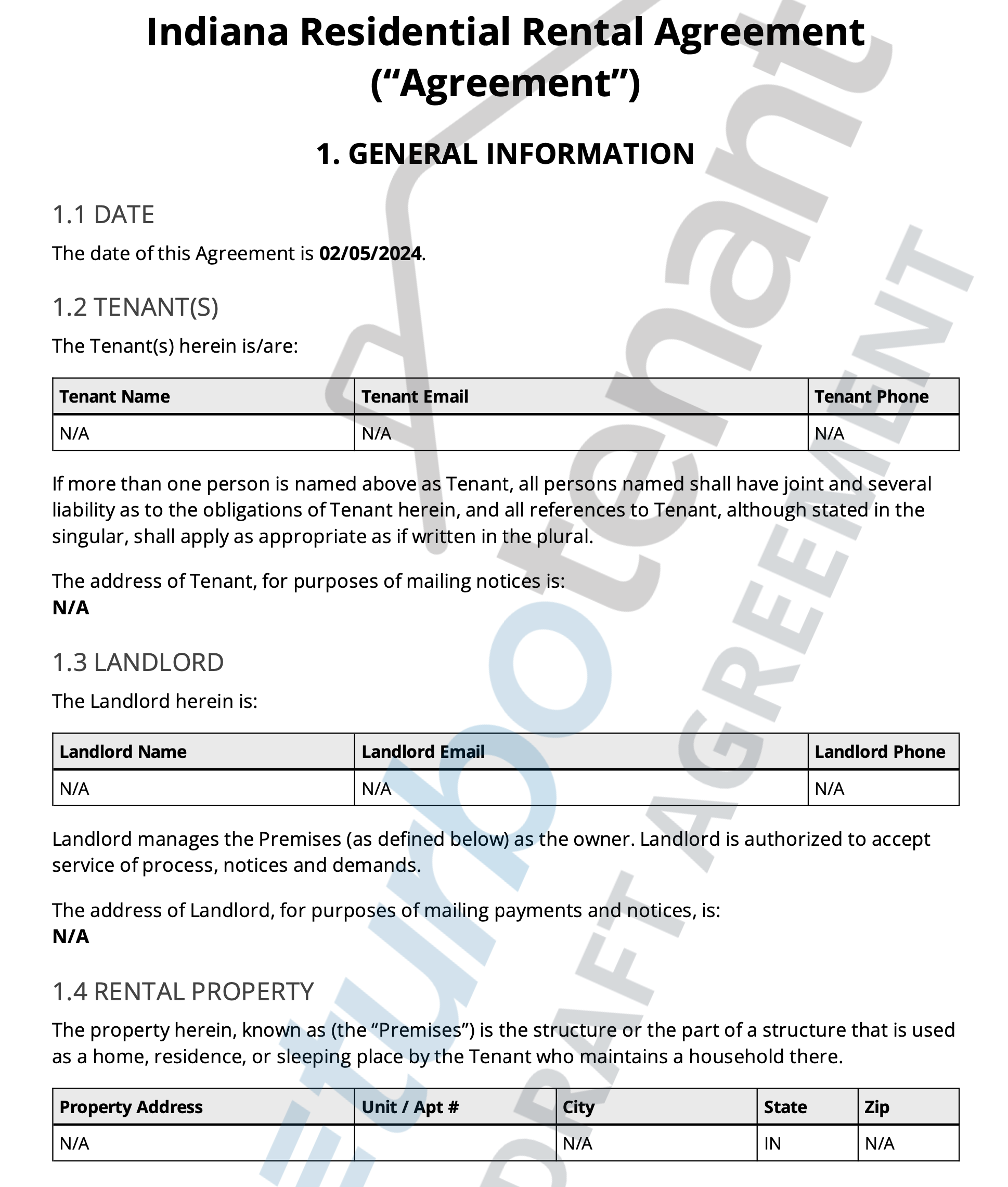
Creating a lease agreement in Indiana is a process that demands thoroughness and compliance with the state’s specific laws and regulations. TurboTenant’s Indiana Lease Agreement Generator and Templates assist landlords in crafting comprehensive, legally compliant lease documents. This article offers insights into the critical elements of an Indiana lease agreement, underscoring legal stipulations and best practices for both landlords and tenants.
Custom Lease
This portion of the lease agreement allows for customization to fit the unique aspects of the rental situation. It includes details such as the identification of all parties, rent specifics, utility responsibilities, among others. Key features in this section include:
Additional Provisions: Here, landlords can include rules specific to the property, necessary local clauses, or other unique details pertinent to their situation.
Lost Key Policy: It mandates that tenants cover the full cost of rekeying the property should they fail to return all keys upon vacating the premises.
Specific to Indiana
This section is tailored to comply with Indiana-specific legal requirements, incorporating clauses critical to ensuring the lease agreement adheres to state laws. Noteworthy provisions include:
Late Fees – Section 2.1: Rent is due in full on the 1st of every month. If tenants do not pay the full rent amount by 5:00 pm on the 5th, landlords are entitled to charge a late fee of 5% of the unpaid rent amount for that month. Security Deposit Provisions – Section 2.4: There is no maximum amount that can be charged, but typically 1-2x the monthly rent is reasonable. Security deposits must be returned within 45 days of lease termination: Occupancy Limits and Guests – Section 2.5: This provision states that only named tenants and their dependents are allowed to regularly occupy the premises. Guests are permitted but for a maximum of 15 days every 6 months, preventing unauthorized long-term occupancy.
Notification of Repairs – Section 2.7: Tenants are responsible for the cost of repairs stemming from their misuse or negligence. They must also promptly inform landlords of major issues that could impact the building’s integrity or safety. Conversely, landlords must handle repairs needed to maintain a healthy and safe living environment.
Notifying of Absences – Section 2.9: Tenants are obliged to notify landlords if they will be absent from the property for more than seven days, allowing landlords to ensure the property remains secure during extended vacancies.
Changing Locks – Section 2.12: If tenants wish to change locks or add security devices, they must submit a written request. While they are responsible for the associated costs, installation is carried out by the landlord.
Flood Zone Disclosure – Section 2.15. Disclosure must be made in the lease for properties located within a flood zone.
General Clauses for Best Practices
This section includes standard clauses found in most lease agreements, emphasizing best practices in the landlord-tenant relationship, such as:
Subletting – Section 3.1: It strictly prohibits tenants from subleasing the property without the landlord’s written consent.
Altering or Improving the Property – Section 3.2: Tenants cannot make any changes or improvements, like repainting, without the landlord’s written approval. This ensures the property’s condition is preserved unless mutually agreed-upon alterations are made.
Follow the Law – Section 3.14: Tenants are required to comply with all applicable laws and ordinances and avoid causing nuisance or annoyance to neighbors. Violations can be grounds for lease termination.

FAQ
What constitutes a valid reason for late fees in Indiana?
Landlords can charge a late fee if rent is not paid in full by 5:00 pm on the 5th of the month, with the fee amounting to 5% of the unpaid rent.
How are security deposits handled in Indiana?
There is no maximum amount landlords can charge for a security deposit, but 1-2x the monthly rent is reasonable. Landlord has 45 days after lease termination to return the security deposit.
Can tenants change locks in Indiana rental properties?
Yes, but tenants must request this in writing and are responsible for the cost, although the landlord will handle the installation.
TurboTenant Indiana Lease Agreements
TurboTenant’s tools facilitate the creation of Indiana lease agreements that are not only compliant with state specifications but also incorporate best practices for healthy landlord-tenant relationships. Utilizing TurboTenant’s resources ensures landlords can confidently prepare lease documents that are detailed, compliant, and tailored to their rental situations.
Indiana Resources

